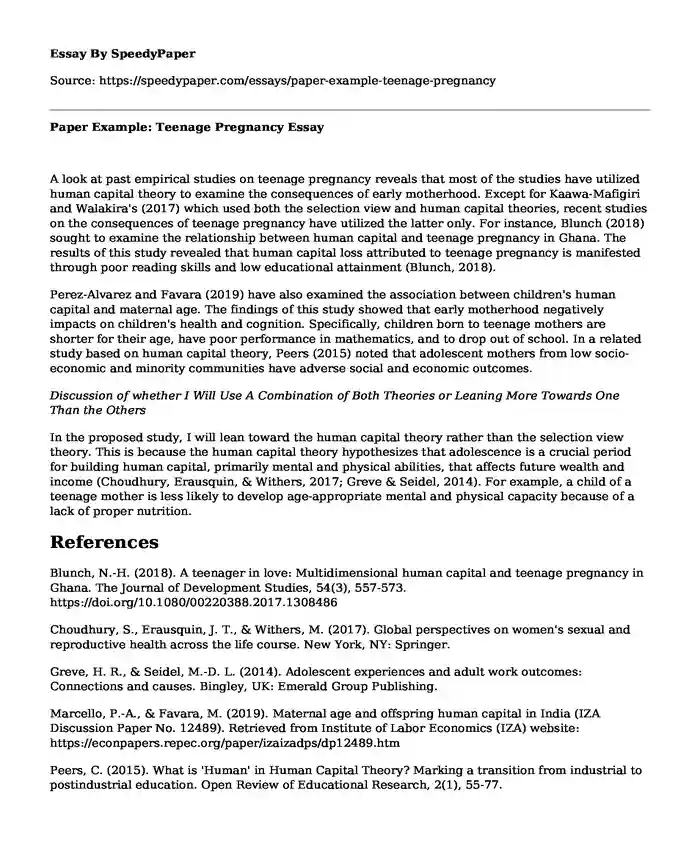
| Type of paper: | Dissertation |
| Categories: | Research Child development Pregnancy Social issue Cognitive development |
| Pages: | 2 |
| Wordcount: | 399 words |
A look at past empirical studies on teenage pregnancy reveals that most of the studies have utilized human capital theory to examine the consequences of early motherhood. Except for Kaawa-Mafigiri and Walakira's (2017) which used both the selection view and human capital theories, recent studies on the consequences of teenage pregnancy have utilized the latter only. For instance, Blunch (2018) sought to examine the relationship between human capital and teenage pregnancy in Ghana. The results of this study revealed that human capital loss attributed to teenage pregnancy is manifested through poor reading skills and low educational attainment (Blunch, 2018).
Perez-Alvarez and Favara (2019) have also examined the association between children's human capital and maternal age. The findings of this study showed that early motherhood negatively impacts on children's health and cognition. Specifically, children born to teenage mothers are shorter for their age, have poor performance in mathematics, and to drop out of school. In a related study based on human capital theory, Peers (2015) noted that adolescent mothers from low socio-economic and minority communities have adverse social and economic outcomes.
Discussion of whether I Will Use A Combination of Both Theories or Leaning More Towards One Than the Others
In the proposed study, I will lean toward the human capital theory rather than the selection view theory. This is because the human capital theory hypothesizes that adolescence is a crucial period for building human capital, primarily mental and physical abilities, that affects future wealth and income (Choudhury, Erausquin, & Withers, 2017; Greve & Seidel, 2014). For example, a child of a teenage mother is less likely to develop age-appropriate mental and physical capacity because of a lack of proper nutrition.
References
Blunch, N.-H. (2018). A teenager in love: Multidimensional human capital and teenage pregnancy in Ghana. The Journal of Development Studies, 54(3), 557-573. https://doi.org/10.1080/00220388.2017.1308486
Choudhury, S., Erausquin, J. T., & Withers, M. (2017). Global perspectives on women's sexual and reproductive health across the life course. New York, NY: Springer.
Greve, H. R., & Seidel, M.-D. L. (2014). Adolescent experiences and adult work outcomes: Connections and causes. Bingley, UK: Emerald Group Publishing.
Marcello, P.-A., & Favara, M. (2019). Maternal age and offspring human capital in India (IZA Discussion Paper No. 12489). Retrieved from Institute of Labor Economics (IZA) website: https://econpapers.repec.org/paper/izaizadps/dp12489.htm
Peers, C. (2015). What is 'Human' in Human Capital Theory? Marking a transition from industrial to postindustrial education. Open Review of Educational Research, 2(1), 55-77. https://doi.org/10.1080/23265507.2014.996767
Cite this page
Paper Example: Teenage Pregnancy. (2023, Mar 22). Retrieved from https://speedypaper.net/essays/paper-example-teenage-pregnancy
Request Removal
If you are the original author of this essay and no longer wish to have it published on the SpeedyPaper website, please click below to request its removal:
- Louis Armstrong Essay Samples
- Essay Sample: Jane Eyre as a Student vs. Jane Eyre as a Teacher/Governess
- Free Essay: Evolutionary Mechanism Behind the Color Difference of Flowering Plant Linanthus Parryae
- Essay Example: Sustainable Competitive Edge for Wells Fargo
- Jonathan Vogel's Argument Against "Moorean's View"
- Essay Sample on Responding to Customers' Complaints
- Exploring Sustainability, Microorganisms, Bioprospecting, and Extraction Techniques - Free Essay
Popular categories




